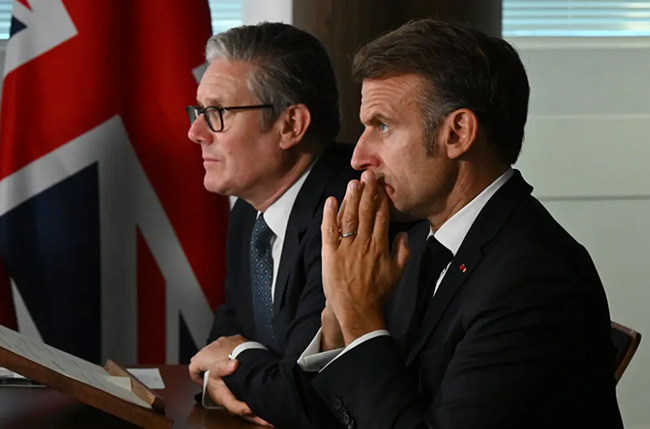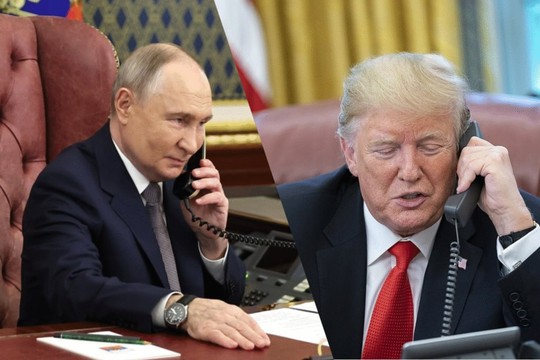WSJ: “Trump and Putin have held multiple calls and passed numerous messages through intermediaries.”
Photo: geopolitika.ru
President Trump has long believed the crux of foreign policy is two leaders in a room making historic deals. Pulling off a cease-fire in Ukraine with Russian President Vladimir Putin would be the kind of diplomatic coup he has long craved.
It remains a long shot, ‘The Wall Street Journal’ notes.
The leaders could meet to pursue a peace agreement following months of maneuvering. But their approaches remain at odds. Trump has urged Putin to stop the war but has shown little interest in the specifics of a deal. The Kremlin boss has rebuffed all appeals to halt the fighting, except on his terms.
After months of failed efforts to forge a deal, first by coercing Kyiv and later by wooing Putin, Trump has come around to the belief that heightened economic pressure on Moscow might be the only way to get an agreement.
Trump returned to the White House vowing he could stop the war in Ukraine within 24 hours, later claiming he was merely joking. Privately, Trump is fuming at his failure to halt the war 200 days into his second presidency, according to aides.
Another challenge for Trump will be navigating talks with a Russian leader who has a quarter-century of experience dealing with various U.S. presidents and has proved himself skilled in influencing them.
If Trump meets with Putin and emerges empty-handed, he will have to decide whether to increase pressure on Russia, despite his skepticism that economic or military moves would alter the Kremlin’s calculus, or follow through on a threat he had made repeatedly to abandon the peace process.
Trump entered his second term confident his rapport with Putin would overcome the complexities of the war Russia launched in February 2022. The president’s supporters say he has been wrongly caricatured as too cozy and deferential to the Russian leader.
“People have misunderstood Trump’s approach,” said Fred Fleitz, who was a senior National Security Council official during the first term. “It isn’t that Trump likes dictators. He believes America has to coexist with Russia. Since we’re not going to war, how do we deal with them?”
Trump and Putin have held multiple calls and passed numerous messages through intermediaries, U.S. officials and other people familiar with their communications said.
Their conversations, according to a senior administration official, have been typically friendly. Trump often discusses his aim of a revived U.S.-Russian relationship propelled by growing economic cooperation.
Their calls extend for hours sometimes due to lengthy Putin monologues and the need for translations, current and former U.S. officials said. Trump, usually impatient and anxious to chime in, listens attentively, aides said.
“Putin does this very methodically,” John Bolton, Trump’s third national security adviser during the first term, said of the former KGB officer. “He’s very knowledgeable, he knows what he’s talking about. When he wants to try and influence somebody, he just talks and talks and talks.”
Putin has carefully studied the new Trump administration and understands where Russia’s leverage with the president lies, said Fiona Hill, who was a top Russia aide in the White House during Trump’s first term. “Putin’s done his homework. He’s had years of figuring out who Trump is,” she said.
Administration officials and close presidential confidants said Trump and Putin didn’t have a single, major blowup this year.
Trump could cut off intelligence and military support for Ukraine, as he did earlier this year, setting back Zelensky’s efforts to align himself more closely with Trump following a combative Oval Office meeting in February. The U.S. could also remove itself from the diplomatic process entirely, leaving Moscow and Kyiv to continue what Trump has long labeled “Biden’s war.”
But those who know Trump suspect he will keep pursuing the most prized deal of his early presidency, where success or failure could define his legacy. “He wants to be the guy who gets deals,” said Marc Short, a first-term senior White House aide. “That is his brand.”
 Both Prime Minister Keir Starmer of Britain, left, and President Emmanuel Macron of France are very nervous.
Both Prime Minister Keir Starmer of Britain, left, and President Emmanuel Macron of France are very nervous.
Photo: Getty Images
For President Vladimir V. Putin of Russia, it is an opportunity not just to end the Ukraine war on his terms, but to split apart the Western security alliance, writes ‘The New York Times’.
Late last month, President Vladimir V. Putin of Russia was facing a stark reality: He was on the verge of losing President Trump, the one Western leader possibly willing to help him get his way in Ukraine and achieve his long-held goal of rupturing the European security order.
Few analysts believe the Russian leader will be content to stop the war based on a “real estate” negotiation alone.
Mr. Putin has made it clear that, among other things, he wants a formal promise that Ukraine will not enter NATO or any other Western military alliances, host Western troops on its territory or be allowed to build up a military that threatens Russia — making Kyiv perpetually vulnerable.
Alexander Gabuev, director of the Carnegie Russia Eurasia Center in Berlin, said Mr. Putin would come into the summit Friday in Alaska pursuing various scenarios.
Those include a favorable deal with Mr. Trump that the U.S. president successfully forces upon Ukraine or a favorable deal with Mr. Trump that Mr. Zelensky refuses, causing the United States to walk away from Ukraine, Mr. Gabuev said.
The third option, he noted, is that the Russian leader continues his current path for another 12 to 18 months, with the expectation that Ukraine will run out of soldiers faster than the Russian war economy runs out of steam.
Mr. Putin understands that Mr. Trump is willing to offer things few other American leaders would ever consider, which could help Russia fracture Ukraine and divide the Western alliance.
“If you could get Trump to recognize Russia’s claim to the lion’s share of the territory that it has taken, understanding that the Ukrainians and the Europeans might not come along for the ride on that, you drive a long-term wedge between the U.S. and Europe,” Mr. Greene, of Kings College London, said.
Stefan Meister, a Russia analyst at the German Council on Foreign Relations, said the two leaders would come into the summit with different goals — Mr. Trump’s being to end the war and Mr. Putin’s being a strategic repositioning of Russia.
“For Putin it’s really about bigger goals,” Mr. Meister added. “It is about his legacy. It is about where Russia will stand after this war. It is much more fundamental.”
read more in our Telegram-channel https://t.me/The_International_Affairs

 10:24 13.08.2025 •
10:24 13.08.2025 •























